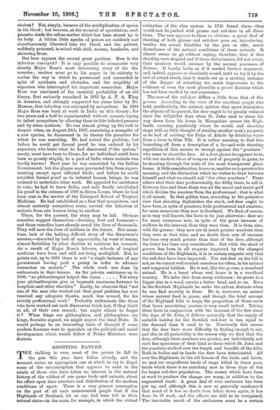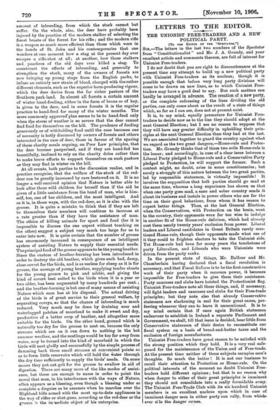ASSISTING NATURE.
THE stalking is over, most of the grouse to fall to the gun this year have fallen already, and the moment seems an appropriate one at which to try to dispel some of the misconception that appears to exist in the minds of those who have taken no interest in the natural history of the wildest of our game birds and animals, about the effect upon their numbers and distribution of the modern conditions of sport. There is a very general assumption on the part of all such uninstructed people that if the Highlands of Scotland, let us say, had been left in their natural state—in the state, for example, in which the virtual
extinction of the clan system in 1745 found them—they would now be packed with grouse and red-deer in all direc- tions. The case appears to them so obvious: a great deal of shooting of both grouse and red-deer goes on, introducing, besides the actual fatalities by the gun or rifle, much disturbance of the natural conditions of these animals. It almost seems to go without saying, therefore, that if this shooting were stopped and if these disturbances did not occur, their numbers would increase by the normal processes of Nature. It hardly looks as if it needed further argument, and, indeed, appears so absolutely sound, until we try it by the test of actual result, that it stands out as a striking instance of the danger of attaching too much importance to the evidence of even the most plausible a priori doctrine which has not been verified by real experience.
The case of the red-deer differs a little from that of the grouse. According to the view of the excellent people who hold, irreflectively, the natural opinion that sport diminishes the objects of its pursuit, the deer ought to be greatly reduced since the delikhtful days when St. John used to shoot his way down from his home in Morayshire across the High- lands, roaming practically where he would, and shooting stags with as little thought of stealing another man's property as he had of robbing the Duke of Athol° by drinking water from a burn in Glen Tilt. It is rather amusing to find him branching off from a description of a far-and-wide shooting expedition of this nature to inveigh against the " poachers " who came to shoot the deer. At a first glance he appears to us, with our modern ideas of trespass and of property in game, to be shooting through the walls of the most transparent glass- house. A little consideration, however, enables us to perceive his meaning, and the distinction which he wishes to draw between himself and what we should call "the other poachers." These others shot their deer professionally, for filthy lucre, to sell it. Between him and them there was all the moral and social gulf which divides the amateur from the professional : that is what it all meant. In that golden time, according to the primitive view that shooting deplenishes the stock, red-deer ought to have been, in spite of poachers, both professional and amateur, far more numerous than now in Scotland. We find, of course, as is very well known, the facts to be just otherwise : deer are far more numerous now, in spite of the great increase of stalkers in the interval, than they were then. It is thus, also, with the grouse : they now are in much greater numbers than they were at that time, and no doubt their rate of increase has been very much greater than that of the deer, although the latter has been very considerable. But while the stock of grouse has been in all respects improved by the changed conditions of the Highlands, it is in certain respects only that the red-deer have been improved. The red-deer on the bill is not, as we cannot well remind ourselves too often, in his natural and congenial habitat. He is not, like the grouse, a moorland animal. He is a beast whose real home is in a woodland country. We infer this from many evidences : he grows to a bigger size in a wood, carries a better head, and so on. Even in the Scottish Highlands he seeks the sylvan districts when he can find security in them. He is, moreover, an animal whose natural food is grass; and though the total acreage of the Highland bills is large, the proportion of those acres that bears nourishing pasture is very small indeed. Taking these facts in conjunction with the increase of the deer since the days of St. John, it follows naturally that the supply of suitable habitat for the Scottish red-deer is less equal to the demand than it used to be. Practically this means that the deer have more difficulty in finding enough to eat, and this in all probability is the reason why we find that the deer, although their numbers are greater, are individually not such fine specimens of their kind as those which St. John and the poachers stalked over the length and breadth of the hills. Both in bodies and in heads the deer have deteriorated. All over the Highlands, in the old houses of the lords and lairds, we may see magnificent heads of stags killed in times past, heads which there is no matching now in these days of the far larger red-deer population. The causes which have been at work to produce the change are many, in addition to the augmented stock. A great deal of wire enclosure has been put up, and although this is now so generally condemned that much of it has no doubt been taken down again, it has done its ill work, and the effects are still to be recognised, The inevitable result of the enclosures must be a certain
amount of inbreeding, from which the stock cannot but suffer. On the whole, also, the deer have probably been injured by the practice of the modern stalker of selecting the finest beasts of the forest for his rifle ; and the modern rifle is a weapon so much more efficient than those which were in the bands of St. John and his contemporaries that one wonders at one moment how a stag at the present day ever escapes a rifle-shot at all; at another, bow those stalkers and, poachers of the old days ever killed a stag. To counteract the effects of inbreeding, and generally to strengthen the stock, many of the owners of forests are now bringing up young stags from the English parks, to infuse an entirely new strain of blood, charged with the rather different elements, such as the superior horn-producing vigour, which the deer derive from the far richer pasture of the
Southern park-land. In almost all forests a certain amount of winter hand-feeding, either in the form of beans or of hay,
is given to the deer, and in some forests it is the regular practice to band-feed for many of the winter months. The more commonly approved' plan seems to be to hand-feed only when the stress of weather is so severe that the deer cannot find food for themselves on the hill. The prudence of feeding generously or of withholding food until the case becomes one of necessity is hotly discussed by owners of forests and others interested in the care of deer, those in favour of the sparing of these charity meals arguing, on Poor Law principles, that the deer become pauperised, and if they are hand-fed too bountifully, inclined to rely on the charity doles rather than to make brave efforts to support themselves on such pasture as they may find in winter on the bill.
At all events, both parties to the discussion realise, and in practice recognise, that the welfare of the stock of the red- deer can be greatly increased by care bestowed on it. It is no longer a well-received opinion that Nature is better able to look after these wild children for herself than if the aid be given of a little assistance from the hand of man, who is him- self, too, one of her children, and the most intelligent. And as it is, in these ways, with the red-deer, so it is also with the grouse. It is quite a mistake to think that if they are left to themselves their numbers will continue to increase at a rate greater than if they have the assistance of man. The ethics of killing animals for sport and food (for it is impossible to discuss the one aspect without touching on the other) suggest a subject very much too large for us to enter into now. It is quite certain that the number of grouse has enormously increased in consequence of an 'intelligent system of assisting Nature to supply their essential needs. T he principal food of the grouse appears to be the young heather. Since the custom of heather-burning has been introduced in order to destroy the old heather, which gives such bad, damp, close covert for the birds, and is as useless for sheep as it is for grouse, the acreage of young heather, supplying tender shoots for the young grouse to pick and nibble, and giving the kind of covert best suited to the birds when it is a year or two older, has been augmented by many hundreds per cent. ; and the heather-burning is but one of many means of assisting Nature which man has at his disposal. The actual driving of the birds is of great service to their general welfare, by separating coveys, so that the chance of inbreeding is much reduced. Very much may be done by draining sour and waterlogged patches of moorland to make it sweet and dry, productive of a better crop of heather, and altogether more suitable for the birds. On the other hand, ground which is naturally too dry for the grouse to nest on, because the only streams which are on it run down to nothing in the hot summer weather, and the nestlings would be too far away from water, may be turned into the kind of moorland in which the birds will nest gladly and successfully by the simple process of damming back these small streams at convenient points so as to form little reservoirs which will hold the water through the dry time sufficiently to supply the birds' needs. On some moors they put out grit for the grouse to swallow in aid of digestion. There are many more of the like modes of assist- ance, but these are enough to name in order to point the moral that man, in his interference with the ways of Nature, often appears as a blessing, even though a blessing under so complete a disguise as he assumes when he marches over the Highland hills armed with the most up-to-date appliances in the way of rifles or shot-guns, according as the red-deer or the
rousa the in:mediate object of his enterprise.















































 Previous page
Previous page